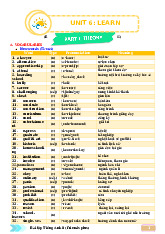


Preview text:
Unit 6 Lớp 8: Culture (trang 95) - Friends Plus Bài 1
Look at the photos and answer the questions. Then read the article and check
your answers. (Nhìn tranh và trả lời câu hỏi. Sau đó đọc bài viết và kiểm tra câu trả lời của bạn.)
1. What job categories can you see? (Bạn có thể nhìn thấy những nhóm công việc nào?)
2. Why do you think some teenagers work in their holidays? (Bạn nghĩ tại sao một số
thanh thiếu niên làm việc vào ngày nghỉ của họ?) Đáp án: 1. Job categories I can see: Picture A: teaching Picture B: engineering Picture C: media Picture D: finance
2. I think some teenagers work in their holidays to gain valuable work experience and
improve soft skills which can be beneficial for their future career prospects. Bài 2
Read and listen to the article again and answer the questions. (Đọc và nghe lại bài viết và trả lời câu hỏi.) Gợi ý đáp án
1. Most teenagers do work experience in the UK in the summer.
2. Because it’s a useful way to find out what jobs you might want to do in the future.
It can also help you to get a job.
3. Placements usually last two weeks.
4. Paul wants to go back to work on the farm when he finishes school. Bài 3
Your Culture Work in pairs and answer the questions. (Làm việc theo cặp và trả
lời các câu hỏi.) Gợi ý đáp án
Yes, teenagers usually do work experience in my country. Part-time or seasonal jobs,
such as working in restaurants, cafes, or retail stores, are the most popular choices for
work experience. This provides teenagers with the opportunity to gain practical skills and interact with customers. Bài 4
USE IT! Imagine your country has a new rule: All fourteen-year-olds must do
work experience in the school holidays. Prepare a class debate. Follow instructions 1–3.
(Hãy tưởng tượng đất nước của bạn có một quy định mới: Tất cả học sinh mười bốn
tuổi phải làm công việc trải nghiệm trong những ngày nghỉ học. Chuẩn bị một cuộc
tranh luận trong lớp. Làm theo hướng dẫn 1–3.)
1. Group A: you agree with the rule. (Nhóm A: bạn đồng ý với quy định.)
Group B: you disagree with the rule. In pairs, write a list of reasons to support your
opinion. (Nhóm B: bạn không đồng ý với quy định. Theo cặp, viết một danh sách các
lý do để củng cố ý kiến của bạn.)
2. Take turns to present your reasons. (Thay phiên nhau trình bày lý do của bạn.)
3. Decide which group presented the best argument. (Quyết định xem nhóm nào đã
trình bày lập luận tốt nhất.) Gợi ý đáp án
Group A: Mandatory work experience would provide valuable opportunities for
fourteen-year-olds to develop practical skills that cannot be learned solely within the
confines of a classroom. It allows students to gain real-world experience, develop a
work ethic, and acquire skills such as teamwork, communication, and problem-solving.
Group B: Fourteen-year-olds are still in the crucial stage of adolescence, where they
require time for personal growth, self-discovery, and building relationships.
Mandatory work experience might impose excessive responsibilities and restrict their
opportunities for leisure, self-exploration, and other formative experiences.
Group A: Work experience at a young age can help teenagers explore different career
paths and make more informed decisions about their future. It exposes them to various
industries, giving them a firsthand understanding of the demands and challenges of different occupations.
Group B: Adolescence is a time of significant emotional and physical changes. It is
important for teenagers to have adequate time for rest, relaxation, and leisure activities
during school holidays. Mandatory work experience may lead to increased stress,
fatigue, and burnout among fourteen-year-olds, potentially affecting their well-being and mental health.



